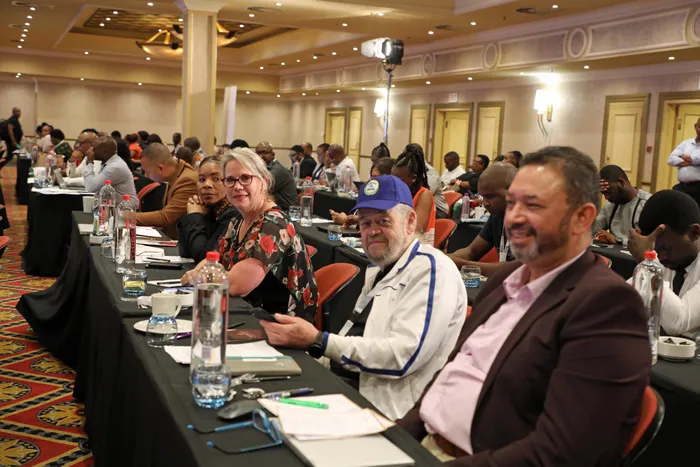Salga absent in coalition chaos

Picture: Timothy Bernard African news Agency (ANA) – Salga meeting, February 16, 2023, Midvaal. Salga was formed in 1996 as an autonomous association of the 257 local governments in the country.
By Dirk Kotze
After the 2021 local government election, the expectation that services in the municipal sphere of government will improve and that problems with coalitions can be addressed, has not been met. Many analyses of what the problems are have been produced.
An institution which does not receive much attention in these analyses is the South African Local Government Association or Salga.
Constitutionally speaking, it is a key player in the municipal field. It also represents the municipal government in Parliament’s National Council of Provinces. But what is this generally unknown entity?
Salga was formed in 1996 as an autonomous association of the 257 local governments. In law, it is regarded as a ‘public entity’ and accountable to Parliament. It has a constitution of its own, a national office, an elected National Executive Committee and provincial executives and its administrative head is a CEO.
Municipalities become members of Salga and they must pay membership fees for it. In essence, it is the representative body of all the municipalities. It acts on behalf of all of them as the employer in collective bargaining with the municipal trade unions.
On the one hand, it looks like an independent organisation that must account for itself in reports to Parliament, but on the other hand, it is deeply entrenched in local government.
In its own words, Salga’s strategic role is to represent, promote and protect the interests of local government in the system of government and to support its members to fulfil their developmental obligations. It is also expected to raise the profile of municipal governments.
The functions Salga ascribed to itself provide an indication of how it can be assessed by its members and the public. The first of the six functions is to lobby, advocate and represent municipalities within relevant structures. The second is to act as their employer body because municipal employees are not included in the central civil service body and are therefore not part of the central public sector bargaining council.
Capacity building is another significant Salga function. Its responsibility is to develop leadership at a local level and develop the technical capacity of councillors and officials. Salga concentrates on financial management capacity building, such as the Municipal Audit Support Programme and the Municipal Public Accounts Committee training.
Capacity is arguably one of the key weaknesses in municipal government. Metropolitan councils have their own training capacity but most councils don’t have that capacity.
Regrettably, the number of councils involved in Salga’s training programmes is too small for it to make the national impact it requires. Although the National School of Government is not yet successful enough as a public sector training centre, similar training facilities – but on a larger scale – are required for municipal government.
Appointments and promotions should be linked to qualifications of such a nature. Take for example the training programmes in the defence force, which over many years have been a prerequisite for promotions.
Salga is also responsible for strategic profiling inside and outside South Africa. It includes South Africa’s international responsibilities or involvement at municipal level in United Nations conventions and programmes, such as global development goals, climate change and the just energy transition.
Cities are becoming increasingly prominent in world events. They host the Olympic Games, COP summits, United Nations conferences, and G7 or G20 summits. Cities also develop their diplomatic relations in the form of twin-city agreements. South African cities have not yet grasped all these opportunities and Salga does not appear to be active in this field.
Local government entered the world of coalition governments in 2006 and, since 2016, it is expanding to all parts of South Africa. Unfortunately, it developed a very bad reputation for opportunistic rent-seeking, very similar to floor-crossing some years earlier.
Salga has not intervened in a meaningful manner to find solutions for the abuses. The public debate includes calls for more regulation of municipal governments, the use of motions of no confidence, minimum thresholds for party representation in a council and related matters.
Salga, in collaboration with the Dullah Omar Institute, drafted a Coalition Government Framework for parties and councillors in providing practical guidelines on forming and managing coalitions. It has not made any impact on the problem.
Salga plays an important part in familiarising new local councillors with their municipal responsibilities. In 2021/22 about 7,484 new councillors and traditional leaders completed the Integrated Councillor Induction Programme.
The institutional glue that must keep the three spheres of government together is the Constitution’s Chapter 3 principle of co-operative government and intergovernmental relations.
The Department of Co-operative Governance and Traditional Affairs as a department is primarily responsible for it. Salga is meant to play a key role in this. On the other hand, the fiscal dispensation, implemented on the guidelines provided by the
Constitution’s Financial and Fiscal Commission, is often not included in the public debate about municipal sustainability. Salga as the collective body of local government in South Africa cannot leave individual struggling local councils in the lurch.
It cannot deny that the crisis in local government is a crisis for Salga, despite its own positive audit reports.
Professor Dirk Kotze, Department of Political Sciences at Unisa.
Related Topics: